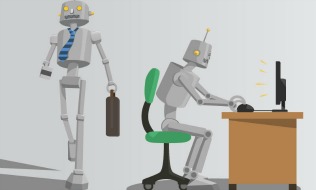

Here’s an interesting excerpt from a media report on the problem of automation eliminating human jobs:
“The number of jobs lost to more efficient machines is only part of the problem. What worries many job experts more is that automation may prevent the economy from creating enough new jobs…. Throughout industry, the trend has been to bigger production with a smaller work force….
“Many of the losses in factory jobs have been countered by an increase in the service industries or in office jobs. But automation is beginning to move in and eliminate office jobs too….
“In the past, new industries hired far more people than those they put out of business. But this is not true of many of today’s new industries…. Today’s new industries have comparatively few jobs for the unskilled or semiskilled, just the class of workers whose jobs are being eliminated by automation.”
That sounds like one of the many articles currently circulating about how robots and AI are going to put us all out of work, right?
It does – except the excerpt above is from a 1961 Time magazine article. Everything old is new again, evidently.
Read: HR is going from in-house to out-of-house
Credit for digging the article up goes to MIT economics professor David Autor, who last year published an excellent paper in the Journal of Economic Perspectives. In it, he asked a very pertinent question: If automation really does kill jobs, why haven’t we run out of them already?
His conclusions shouldn’t surprise anyone who understands how technology in general progresses and elevates the nature of work.
Autor points to several good examples to illustrate the point. The arrival of passenger cars in the early 20th century, for example, killed off many equestrian travel jobs, but kick-started the entire road-side motel and fast-food industries.
Similarly, the advent of automated teller machines in the 1970s actually led to an increase in the number of human tellers. With their cost of doing business lowered, banks opened more branches and hired more tellers, who evolved away from being cash dispensers into “relationship banking.”
Read: Hire staff with interpersonal skills to boost your bottom line
The current wave of robots and AI are but the latest phase of this automation, Autor writes, and they’ll similarly lead to a different paradigm of human jobs. But there will be human jobs – and they will likely be better than many that exist today.
“My own prediction is that employment polarization will not continue indefinitely. While some of the tasks in many current middle-skill jobs are susceptible to automation, many middle-skill jobs will continue to demand a mixture of tasks from across the skill spectrum,” Autor writes.
“The issue is not that middle-class workers are doomed by automation and technology, but instead that human capital investment must be at the heart of any long-term strategy for producing skills that are complemented by rather than substituted for by technological change.”
Read: Do employees have too much freedom?
This story was originally published on Benefits Canada‘s companion site, CanadianBusiness.com
